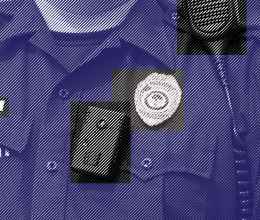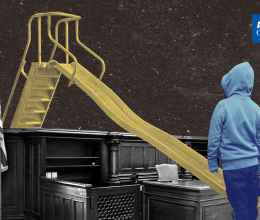In the last year, we’ve seen countless articles about School Resource Officers (SROs) in schools and how they exacerbate the school-to-prison pipeline for students of color - and especially Black students. However, we rarely hear from the students themselves, for many reasons.
But here I am.
Here I am as a student who has faced unnecessarily harsh discipline multiple times as a student in Cincinnati Public Schools (CPS). Here I am as a student whose interaction with CPS and the Cincinnati Police Department (CPD) follows me to this day.
When I first began at Walnut Hills High School in seventh grade, I received several detentions for talking.
Then, the next year, a fellow student called me a slur. School administration refused to pursue it, but I refused to let it go. I wanted some form of justice, some accountability. It was only after he called me the same slur twice more that the administration gave him an in-school suspension.
But everyone ignored the harm done to me. I was left with the trauma and no resources to actually help me process the events that had taken place.
Then, in ninth grade, I called a teacher out for her racist application of discipline. I had left a note on a quiz that read, “If a teacher allows white students to continuously act out and disrupt class, but punishes a student of color for doing the same thing, the teacher is racist”. It was snarky, yes, but I didn’t trust the administration to take care of me. I didn’t know what my other options were. You would think this would lead to a conversation between the teacher, administration, and me, but instead I was simply punished for this injustice. The grade level principal told me I could either write an apology to the teacher or receive discipline that would go on my permanent record.
I wrote the apology. I was scared they would tell my parents and I would get into trouble. I was scared of the risk to my future.
So I gave in.
And like the last time, I was left alone with the hurt, attempting to process this injustice on my own.
When I became an upperclassman and my discipline escalated, I understood the true purpose of the discipline I have continuously been threatened with: control.
I was only 16-years-old, a junior. I led a walkout protesting the climate crisis at my high school with the Young Activists Coalition and Ohio Youth for Climate Justice on September 20th, 2019. Hundreds of Walnut students left class and rallied in front of the school. After the school demonstration, another organizer and I walked to their car to attend the main climate strike at city hall. But the police showed up and told us to go back into the school. We did not respond; we continued walking to the car and quickly got inside.
What happened next seemed like it was in slow motion, and to this day - over a year later - my mind can’t stop replaying the events that happened next.
I am sitting in the backseat of the car.
The police bang on the window.
They tell us to turn the car off and lower the windows.
They say it like we are dangerous - like we are fugitives.
We are told to step out of the car.
Suddenly, I’m arguing with a School Resource Officer (SRO) and a security guard.
They tell me if I leave school, they will throw me in jail.
I am afraid. I am angry. I want to get back into the car, away from them, to safety.
This doesn’t feel like the ‘good relationship with students’ the SROs and CPS had promised.
They march us back inside Walnut Hills like prisoners.
I feel powerless. I feel small.
In the office, I am now arguing with a guard; I want to call my parents to prove that I have “permission” to practice my First Amendment rights. He refuses. I am not allowed to talk to the office to get a note to leave the school. I am told that I have been too disrespectful. Friends are calling and texting me asking if I am okay, if I got out alright, if I have the math homework (I don’t).
After what felt like hours, an assistant principal gave me an in-school suspension and let me go. This suspension will be on my record. This suspension prevents me from ever being class president, a position I had held for five years from which I would have been able to continue representing student concerns, again, in another way.
My white co-organizer was given a Friday detention.
To this day, I still don’t know why we were given different punishments for the same action.
But I can make an educated guess.
The next week, when I was given my formal suspension slip, my family and I decided to appeal the suspension. We were supposed to meet with the school principal and the assistant principal. I prepared by collecting teacher and student statements in my support. I found parts of the student handbook showing I should have been given a Friday detention, not a suspension.
I thought it was just a mistake.
I thought if I just showed the administration the mistake, they would fix it and everything would be okay.
I was wrong.
On the day of my appeal, we walked into the office, and the principal was not there. Rough start. In his place were two assistant principals: one who suspended me and his colleague who was supposed to be an “impartial” judge of the situation. I was appealing my suspension to the very same people who punished me. I asked if I can show the two administrators the evidence I had collected over the past week to show that they had made a mistake. They told me that they didn’t need to see it. They had made a decision before I ever had an opportunity to defend myself. The appeal was just a formality for them. There wasn’t some grand belief that it would make me a better person in their eyes or repair some perceived harm. It was solely a way for them to show that if I did something they didn’t like, they could punish me as much as they wanted - and there wasn’t anything I could do about it. I was a pawn in their game of power and discipline.
I eventually served the suspension. I was forced to skip an entire day’s worth of education because I had attempted to forgo my classes for a day in order to exercise my First Amendment rights and attend a protest.
My punishment for missing class was to miss more class.
In retrospect, I realize how lucky I am to have the support of my family, to have the privilege that my parents could come to my school to help me. But thousands of students in CPS don’t have that privilege. How many other children have been suspended or even arrested solely because they had no one there to defend them - or because an administrator simply decided they deserved it? Students deserve better than to be treated like criminals in their most vulnerable moments. We deserve respect, dignity, and fairness.
It was this experience - being threatened with arrest by an SRO and suspended in one day - that forced me to see the bigger picture of what has been happening in Cincinnati Public Schools. SROs are designed to police and criminalize students of color for regular childhood behavior, with a particular focus on Black CPS students. I have seen and personally experienced how the use of punitive, exclusionary discipline is disproportionately used against students of color and how it serves as the school-to-prison pipeline’s most valuable asset.
On my own, I am powerless.
On my own, I cannot stop the police from harming me or from school administrators punishing me without any regard for helping me heal. It was this powerlessness in the face of the police and punitive discipline that pushed me to look for some way to change the system. No one else should ever have to experience the feeling of shaking when you walk past cops in your very own school hallways, the automatic reaction of choking up at just the sight of the administrators that were supposed to protect you.
And I am not the only one. There are thousands of students just like me who have experienced this - and worse.
Through the failure of the system that punished me harshly and unnecessarily, I found my answer in the Young Activists Coalition’s Fix Our Schools campaign, and I found my strength and my voice again.
Through this campaign, I have discovered that fighting in solidarity with your friends and family is a power that no institution can overcome, that with the support of my community, we can replace all SROs and zero-tolerance policies in CPS with restorative justice and mental health support.
And I assure you, no matter how long it takes, no matter how many protests or meetings or surveys it takes, we will win.
We will win because we have no choice but to win.
Take this survey to add your thoughts about school discipline and CPS.
Yousuf Munir is a senior at Walnut Hills High School in Cincinnati Public Schools and is the president of Young Activists Coalition.







